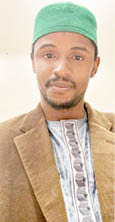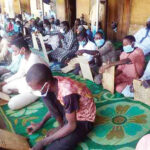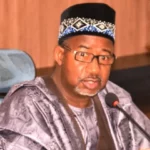Columbia is an Ivy League University, which is one of the eight most prestigious institutions in the USA.
Ph.D. students at this university undergo two years of coursework. One of the classes I took was Islam Knowledge and Forms, instructed by a visiting Professor from Germany.
Part of the course is a library visit to the exhibitions section under the project of Islamic Sciences, Science, Nature, and Beauty: Harmony And Cosmological Perspectives In Islamic Science (2022) at Butler Library, the largest library of Columbia University with millions of resources.
The exhibition contained objects, images, rare manuscripts, and other learning materials. Two materials, among others, became the most astonishing factors in the exhibition: one of them is a rare copy of the Holy Quran, and the second is a locally handmade wooden tablet (Allo).
- Grief, shock in Kano community as abortion claims teenager’s life
- Why I want to be the next Nafisa Abdullahi of Kannywood – Zubaida
The Instructor asked everyone to talk about any material in the exhibition. Students gave their feedback on the experiences passionately; different things wowed everyone.
When it came to my turn as someone who had known these items since my childhood in my father’s private library, where we sneaked as children, which housed similar treasures. To us, these are the most useful items in his library as we do not read books; we only view images and magazines, such things that are not viewed as essential to the readers.
Then, I shared my familiarity with these items, and I told them I was exposed to most of the exhibited materials from my upbringing in Northern Nigeria, including “rare manuscripts” of the Quran. The Quran displayed was a giant copy of the original Uthmanic Quran.
Denoted to the third Caliphate of the Muslim nations who reigned (644/23H–656/35H); it was so amazing to all of us. As for me, the Quran was the most frequently read book in my entire life, and to their surprise, I can read this copy fluently without diacritical marks.
I highlighted that memorising the holy Quran, even without understanding the Arabic language, is common in Northern Nigeria. Most of my fellows never knew that sometimes people memorise it at an early age. I did not shock them with that, as I am one of them.
In the second incident, Professor Brinkley Messick invited me to speak in his class on Islamic Sharia Law, as someone who had experience with an Islamic Madrasa background and went to Azhar University in Egypt. The theme of the class is the Islamic Madrasa.
The Professor brought Allo a wooden tablet to the class and circulated it to students. Everyone was looking at it with surprise. I named it to them as a personal tablet for inscription and memorisation of the holy Quran, and the students asked for more details.
I said we write verses from the holy Quran for memorisation after repeating it several times; not everyone understands how that works, except those with Islamic background. However, when I told them when we wash the script, we drink it, everyone was left with open mouths, surprising our embodiment of the holy book, including the professor.
They could not process as modernised individuals with high sensitivity to germs and bacteria. Again, I told them, as I told our class last semester, that this is very common in Northern Nigeria. Coincidentally, we have one of the attendees from a Saudi background who added that people used some scripts for Talismite and protection from the Jin Ruqyā in Arabic language or Ruqiyya in Hausa language by reciting some verses in water.
I told her that this is true; we have that part in our culture too, but the biggest part of it is that we drink washed script for the embodiment and showing respect of not letting a drop of that water on the ground as a sacred word. We were told as kids whatever verses you memorise from the holy Quran and drink will stay in your hearts for a long time.
In reference to that, American Professor of Islam in Africa Rudolph Ware published his book Walking Quran, on the Madrasa system in West Africa.
He referred to those Quranic students’ embodiment as the Walking Quran in relation to the narration of the Hadith reported in the books of Hadith such as Sahīh Muslim; Aisha was asked about Prophet Muhammad’s PBUH character, and she said he was a Walking Quran.
Our cultural legacy, often undervalued in our region by some of us, gained recognition at Ivy League institutions. Those people appreciate a centuries-old Quranic educational tradition or Almajiri system and show their respect to our subregion, and even our way of drinking the washed script of the Quran is mesmerised to them. A professor dedicated his projects to studying a school system called Daara schools in Senegambia or the Tsangaya schools in Northern Nigeria, making it evident that our legacy is an astonishing point to those communities.
Then, as indigenous Africans who were introduced to the colonial system of education less than a century ago in Northern Nigeria, we should be more proud of our system by appreciating those communities who choose to preserve it, as they make our subregion a central point of high intellectual conversation around the world. We should not deny our legacy by stigmatising the Almajiri system of education.
Instead, we should support it and create a way of modernising it to empower and preserve our centuries-old legacy. Whoever shows kindness to the Quran and its reciters will receive people’s applause in this life, including Western intellectuals, and God’s reward in the hereafter. Thanks to those state governments in Northern Nigeria who support and recognise this system of education.
Thank you for reading.
Umar Sheikh Tahir, a Ph.D. student at Columbia University, New York, USA can be reached via: [email protected]

 Join Daily Trust WhatsApp Community For Quick Access To News and Happenings Around You.
Join Daily Trust WhatsApp Community For Quick Access To News and Happenings Around You.


